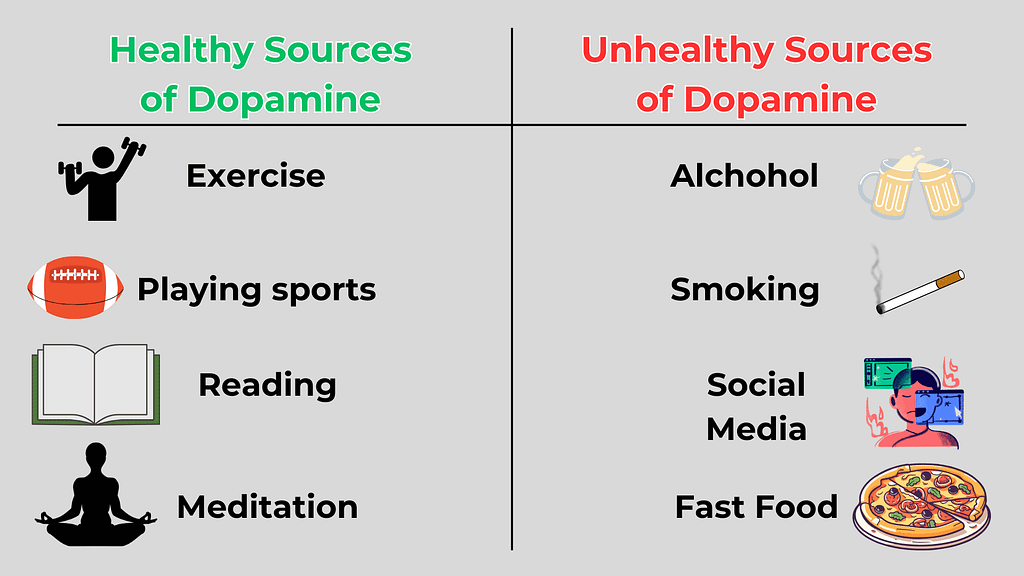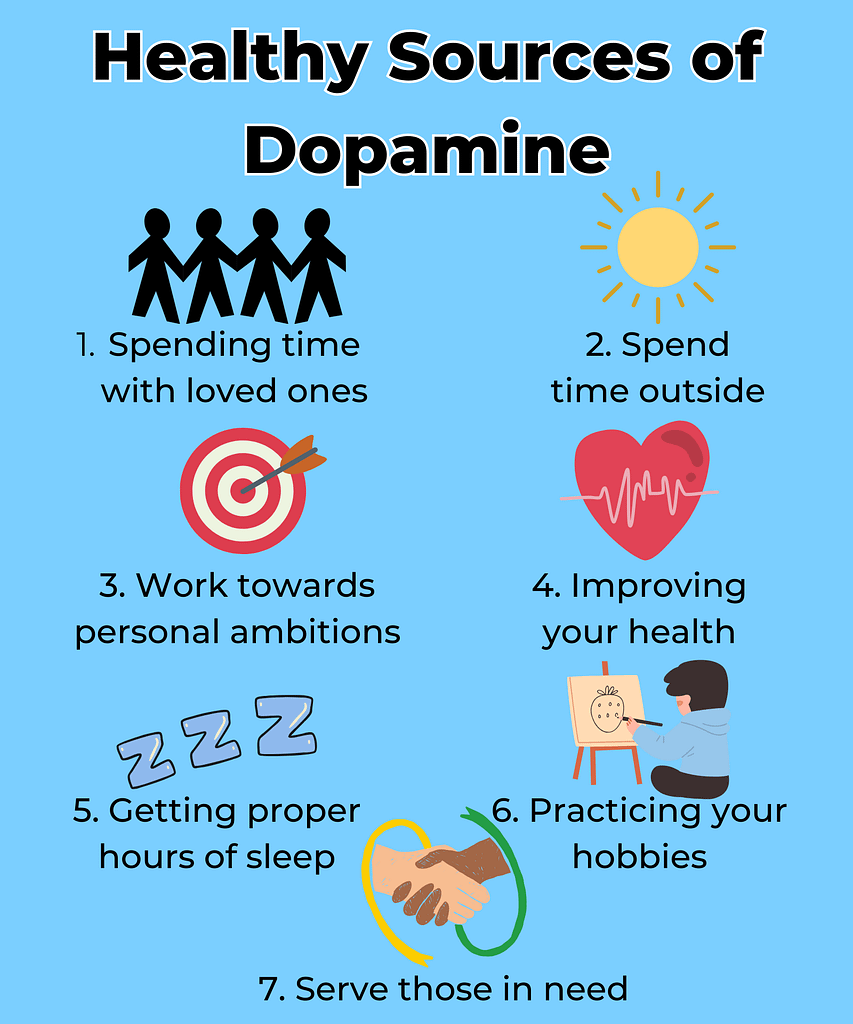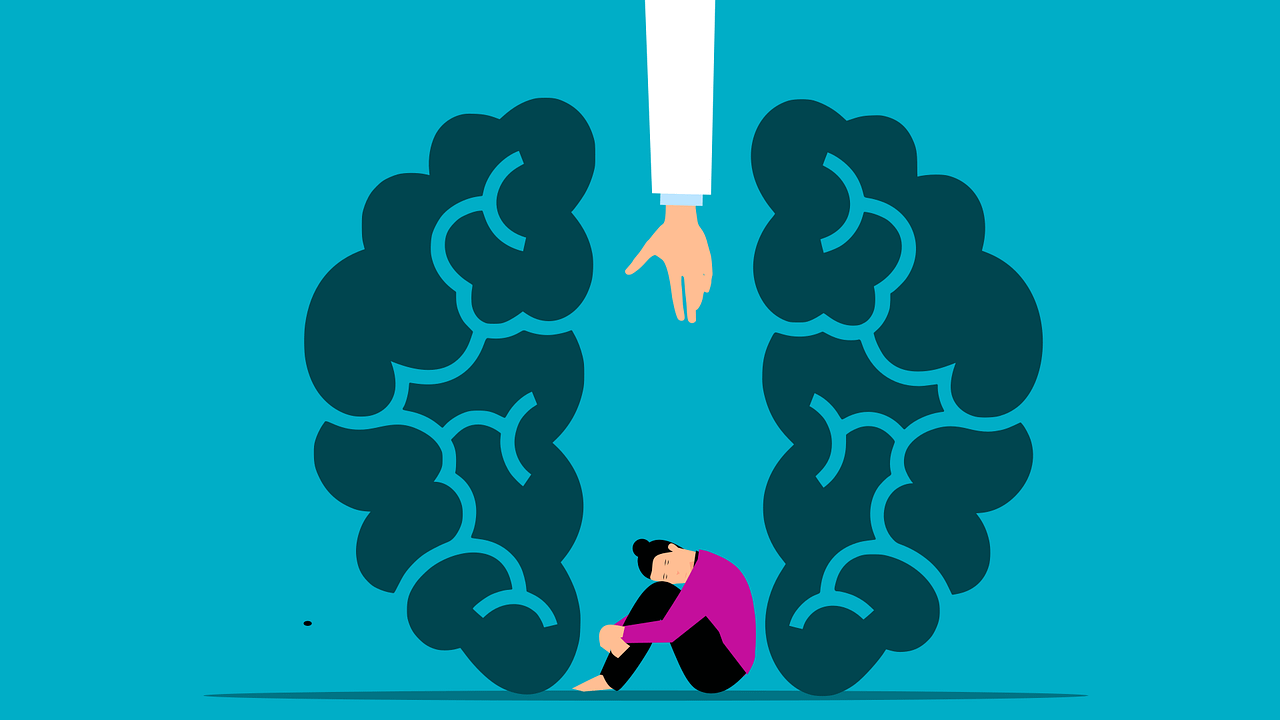What you do at the end of a long day to “relax” isn’t helping you relax. Yes, that includes scrolling on social media, consuming junk food, playing video games, and watching Netflix

Indulging in these activities makes us joyful, but it’s only temporary—they’re bad habits disguised as reliefs of happiness. Despite the consequences, we’ll continue to practice these bad habits because nothing else delivers the same level of pleasure. Instead of adopting this mentality, we should resort to healthy sources of dopamine that aren’t detrimental to our health.
What is dopamine and why should I care?
Essentially, dopamine is your brain’s why and motivation for taking action. It’s responsible for the feeling of pleasure, excitement, and satisfaction. Our brains learn to crave these feelings, making it easy to run to that activity but hard for us to run from it.

For instance, the dopamine rush from scrolling on TikTok makes it incredibly difficult to put the phone down after opening the app.
Dopamine is necessary for the foundational function of life by allowing us to experience happiness. Without it, life would feel dark, gloomy, and meaningless.
Healthy sources vs unhealthy sources of dopamine
Everything we encounter can trigger dopamine, whether from healthy or unhealthy sources. The unhealthy sources, such as smoking and drinking, make us feel pleasurable, but that doesn’t mean they’re the best for us. The healthy sources are the opposite; they bring pleasure without any negative consequences on our health.
Recognizing the sources of our dopamine, whether healthy or unhealthy, can help us eliminate bad habits and keep our lives from spiraling out of control.

Replacing unhealthy sources of dopamine can also be the same as learning to incorporate delayed gratification, which you can learn more about here.
The following list includes seven healthy sources of dopamine that you should replace your unhealthy sources of dopamine with.
1. Spending time with friends and family
Socialization and communication have always played critical roles in the success of the human race. However, due to the COVID-19 pandemic in 2020, we were forced to adhere to certain restrictions that kept us from being social. As a result, many of us became so accustomed to living in our own isolated world that interacting with others now feels out of place.
Nevertheless, spending time with the people we love remains a healthy source of dopamine that boosts our happiness and well-being.

Liz Mineo from Harvard wrote, “Close relationships, more than money or fame, are what keep people happy throughout their lives, the study revealed.”
Failing to spend more time with your loved ones is a common regret many people have. We all live our busy lives, but the effort to interact with those we care about when we have time is something we will never regret. When we reflect on our lives in the future, we will value the times we spend with loved ones over social media, video games, and alcohol.
2. Spending time outdoors
The Earth’s surface area spans over 190 million miles of beauty, waiting for you to discover it. We can’t find it in our room, workplace, or classroom, but we can find it by stepping outside no matter where we are.

The time we spend outdoors, whether by taking a quick walk or hiking without any headphones in our ears, is enough to make us feel at peace and alive again. There’s a reason for this; it serves as a temporary escape from stress that is healthy and sustainable.
3. Working towards your purpose
Every living organism on Earth has a unique purpose, including animals and plants. Our purpose is more than the material gains we desire; it’s how we can best contribute and serve our friends, family, and community.
For instance, becoming a teacher due to your passion for helping students receive a quality education is influenced by our personal ambition, but the desire to see students succeed fuels that ambition even more.

Tracer Brower from Forbes wrote, “To find happiness with purpose, consider what matters in the bigger picture and how your role can make a difference to others.”
Knowing our purpose gives us direction, and working toward that brings satisfaction as a result of knowing how it impacts others. The satisfaction we receive from working toward our purpose comes from a healthy source: we’re working to create a positive impact on those around us while pursuing something we’re passionate about.
4. Being healthy
Being physically and mentally is a tremendous accomplishment that should never fly over your head. Even if you’re continuously working to become your best self, the efforts you’re putting in truly matter. Being healthy is something your future self will always be appreciative of and something you’ll never regret.

Taking action to become your healthiest self, whether by eating a nutritious meal or working out, can feel daunting; however, the long-term benefit significantly outweighs the short-term discomfort. The long-term benefits we receive, including a boost in confidence and reduced risks of health complications, result in a sustainable form of long-term pleasure.
For reasons why you should regularly exercise, read here.
5. Getting proper hours of sleep
Sleep has always been non-negotiable; we need it to survive, but many of us are guilty of not sleeping enough. The CDC discovered that “1 in 3 adults in the United States reported not getting enough rest or sleep every day.”
Not only does lack of sleep put us at a higher risk of health complications, but we suddenly feel as if life is ten times more miserable. Imagine only getting four hours of sleep and having to work your 9-5 shift the next day. How would you feel? How can you focus?

Nora D. Volkow, the director of the National Institute on Drug Abuse claimed sleep-deprived humans inhibited certain parts of dopamine transmission, meaning brain cells could release dopamine, but were unable to receive it.
The dopamine we receive from waking up the next day from a good night’s sleep is healthy and gives us energy. Thus, we should continue cultivating enough sleep daily, as it boosts our well-being and allows us to find joy in other areas of our lives.
6. Spending time with a hobby of yours
As humans, we’re all unique in various ways, whether that be our ethnic background, hometown, or physical traits about ourselves. Nevertheless, it’s the interests and hobbies we spend during our free time that further shape our uniqueness.
While engaging in an enjoyable activity, our brains react to this excitement by releasing dopamine. Of course, anything can bring us joy, whether it’s healthy or unhealthy for us. For instance, smoking brings pleasure, but so does donating to charity.

Differentiating the pleasure we receive from our hobbies and bad habits can be justified by examining how we feel afterward. Do you regret taking that shot? How do you feel after staying up late at night? Do you wish you never went to that party?
Instead of relying on unhealthy habits for pleasure, replace them with your hobbies. Engage in hobbies that promote mental well-being and promote creativity, and reject the bad habits that offer a band-aid to a gashing wound.
7. Serving those in need
Neuroscientist Jorge Moll at the National Institute of Health discovered that generous people who donate or volunteer are happy and are likely to continue doing the same. The same areas of the brain that receive pleasure from food or sex are also activated when participants think about giving to charity.

Knowing that we can find the same pleasure of sex and food in serving others, there’s no excuse as to why we shouldn’t be there for those we care about. Being a great friend, brother, sister, or parent is more worthwhile than any materialistic item on this Earth. The car is worth a lot, but what’s worth more: that car or your relationship with your family?
Our motive behind helping others is quite significant: you shouldn’t help others to boost your ego and to receive validation from others. Instead, you should help others because you genuinely care about them.
Conclusion
Dopamine has its pros and cons; it allows us to experience pleasure in everyday life, but too much of it can keep us chained to bad habits and addictions. Instead of becoming addicted to the source of dopamine that feels good at the moment but derails our health over time, we can find the same amount of joy in the things that feel good and serve us better in the long term.
It’s not easy letting go of the things that have always given us pleasure—smoking, drinking, partying. Still, it also isn’t easy seeing ourselves deteriorate from a cycle of bad habits.



